

Running a veterinary practice is no easy task. The workload can get overwhelming fast between managing appointments, keeping up with patient records, and communicating with pet owners. That’s where veterinary software programs can help you.
These powerful tools are designed to relieve daily operations stress, helping clinics run smoothly and efficiently. From keeping track of medical records or scheduling visits to managing inventory, the right software can make all the difference.
This article will discuss the five key types of veterinary software every clinic should know about before starting a vet practice.
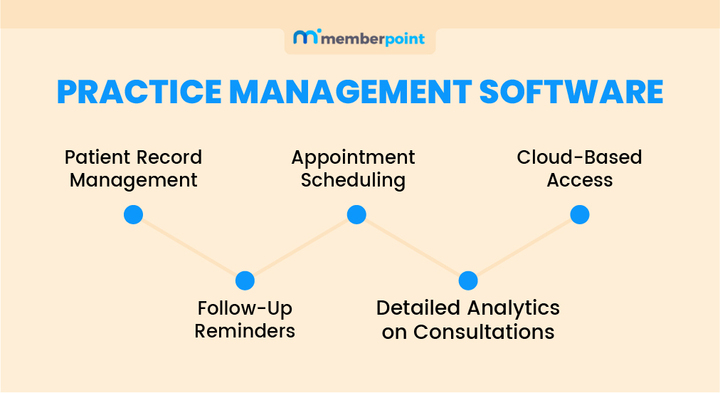
PMS allows veterinary clinics to handle their day-to-day duties. It keeps records safe and organized. Vets can quickly access pet information and focus more on treating animals than doing paperwork. Pet owners also stay updated with reminders and follow-ups. This enhances the clinic’s services and provides pets with the most satisfactory care imaginable.
By automating data entry, PMS reduces the risk of errors, ensures data security, and makes the clinic more organized.
Patient Record Management: Practice Management Software stores all pet information in a central database. Each pet’s medical record, including vaccinations, past diseases, and therapies, is securely and efficiently available.
Appointment Scheduling: PMS makes securing appointments for regular checkups, vaccinations, or emergency visits straightforwardly. The software organizes appointments, bypassing dual bookings or disputes.
Cloud-Based Access: PMS accounts data in the cloud, meaning it’s available from anywhere. Vets and teams can access patient data even when off-site, which is helpful for emergencies or portable veterinary procedures.
Follow-Up Reminders: Pet health professionals must track follow-up meetings. PMS automatically reminds vets to plan follow-ups and mail them to pet owners. Follow-ups are vital for monitoring recovery and addressing any ongoing issues.
Detailed Analytics on Consultations: PMS generates detailed reports on patient consultations. These reports include data on the number of appointments, types of health problems treated, and the results of these appointments. It also delivers insights into the clinic’s performance, allowing for more suitable management and planning.
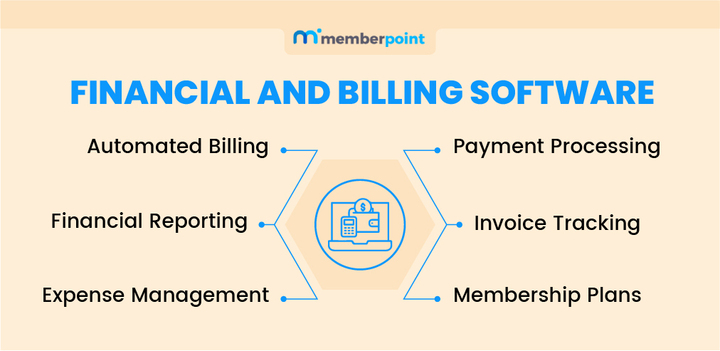
Financial and billing software helps veterinary clinics manage their finances. It makes billing quick and accurate. The software also keeps records of all payments and expenses, which allows clinics to assess their financial health. With fewer mistakes and faster billing, vets can spend more time caring for pets and dealing less with payment issues.
Automated Billing: Financial software can automatically create bills for each visit. This helps save time and ensures the bills are correct.
Payment Processing: It enables clinics to take payments quickly and efficiently. Pet owners can pay using currency, credit cards, or even online, making it suitable for everyone.
Financial Reporting: The software tracks all the money arriving in and moving out and produces information enabling clinics to comprehend their financial health better.
Invoice Tracking: The software allows you to manage all invoices. It shows which are paid and still due, making it easy to follow up with pet owners.
Expense Management: It records all the clinic’s expenses, such as supplies and medicines. This feature helps vets see where money is being spent so they can better manage it.
This software is designed to help veterinary clinics manage wellness plans, loyalty programs, and subscription-based services for pet owners. It simplifies the administration of memberships and ensures clients have access to regular check-ups, treatments, and preventative care, often at a discounted rate.
MEMBERPOINT
Clinics adopt subscription-based wellness plans to provide ongoing care and services to pet owners.
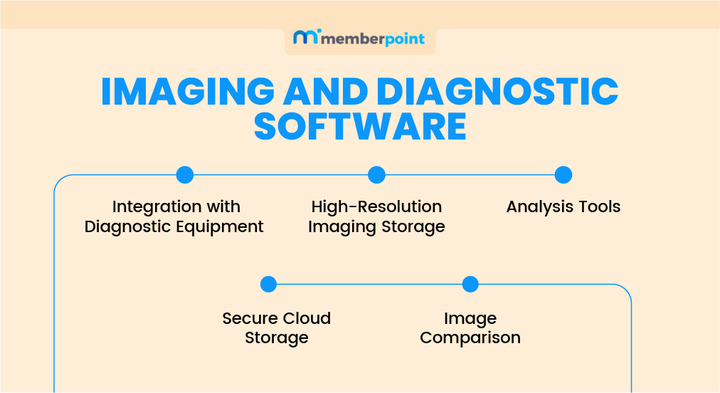
Imaging and diagnostic software help vets clearly understand what’s happening inside pets. It connects with tools like X-rays and ultrasounds, quickly providing high-quality images that help vets better understand the health problem. With tools to analyze and compare photos, vets can track how a pet is doing over time, giving them the best care possible.
It makes it easy to look at images, save them, and understand what is happening. This helps vets make better decisions and give pets the care they need.
Integration with Diagnostic Equipment: Imaging software links with X-ray, ultrasound, and other diagnostic devices, making it effortless to view photos immediately.
High-Resolution Imaging Storage: The software saves images in high quality. This helps vets see details clearly, which is essential for diagnosis.
Analysis Tools: Imaging software has tools that help vets analyze images better. They can zoom in, change brightness, and highlight spots that require concentration.
Image Comparison: The software lets vets resemble new and old images, enabling them to notice differences in a pet’s infection over time.
Secure Cloud Storage: Images can be kept in the cloud. This means vets can access them from anywhere and keep them safe.
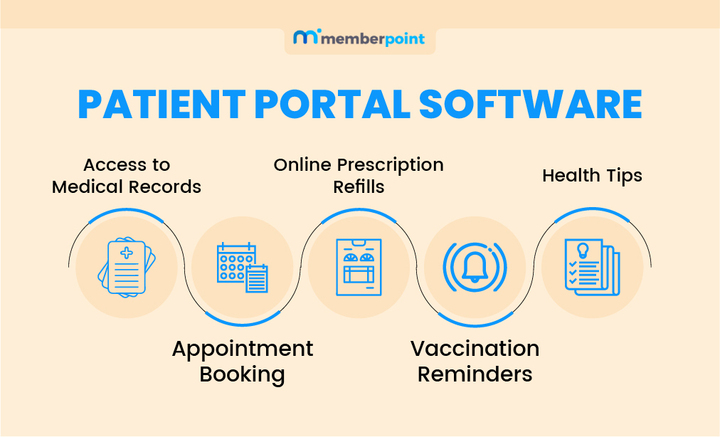
Patient portal software makes it effortless for pet owners to handle their pets’ care. They can secure appointments, review records, and order refills online. This reduces the number of clinic calls and makes the work more accessible for the staff. It also helps pet owners feel more connected to the clinic. This means pets get better care, and owners stay happy.
Access to Medical Records: Pet owners can consider their pets’ fitness records anytime, which allows them to stay knowledgeable about their pets’ care.
Appointment Booking: Owners can reserve appointments online, preserving time for the clinic and the pet owners.
Online Prescription Refills: Pet owners can ask for medicine refills, which allows secure pets to bring their medicines on time.
Vaccination Reminders: The portal transmits reminders for vaccinations. This holds pets up-to-date with their shots.
Health Tips: It also gives pet maintenance information so pet owners can know how to maintain their pets healthily.
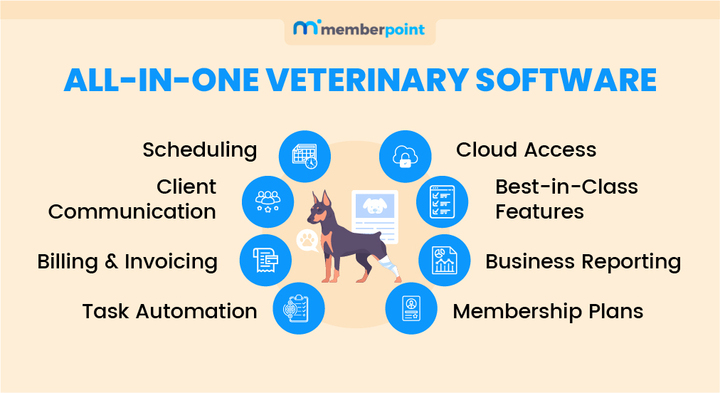
All-in-one veterinary software is a game-changer for clinics looking to streamline their operations. By integrating various features like appointment scheduling, medical record management, client communication, billing, and inventory tracking into a single platform, these solutions save time and reduce administrative hassles.
Scheduling: The software makes booking appointments simple. It helps keep track of daily schedules, so time is well-spent.
Client Communication: All-in-one software allows clinics to send messages and reminders to pet owners. This keeps everyone informed and helps pets get the care they need.
Invoicing and Payments: It handles billing and payments smoothly. Pet owners can pay online, making the process quick and easy.
Task Automation: The software can do simple tasks automatically. It sends reminders, creates invoices, and updates records without anyone having to do it manually.
Business Reporting: It provides detailed reports about the clinic’s activities. This helps vets understand how well the clinic is doing and where they can improve.
Cloud-Based: Every record is stored online. This allows vets to access patient documents and timetables from anywhere, even when they are not at the clinic.
Membership Plans: The software presents adaptable membership plans for pet owners. These plans help keep pets healthy with regular checkups.
Best-in-Class Features: All-in-one software has top qualities that cover every aspect of clinic operations. It assists with patient care, contact, and caring clinic teams, all in one place.
Understand your clinic’s needs to select the best software. Look for components like scheduling, billing, and patient management. Ensure it is effortless, suits your budget, and has satisfactory customer aid. It would also be helpful if the software could evolve with your clinic.
Many veterinary software applications are cloud-based, permitting mobile phone and tablet entry. This makes it more comfortable for vets to handle tasks on the go.
Mostly, the veterinary software is cloud-based, which requires an internet connection. However, some features may work offline and sync later when the internet is available.
Veterinary software costs vary. Some software offers flexible pricing or basic versions, making it affordable for smaller clinics.
Membership software manages recurring subscriptions and wellness plans, while CRM software handles client relationships and interactions without specialized tools for memberships. Read more
Veterinary software programs are crucial in making clinic operations smoother and more efficient.
From managing patient records and appointments to improving client communication and tracking inventory, these tools help veterinary professionals provide better care while reducing administrative work.
Each type of software we have covered brings its own benefits that can transform how a veterinary practice runs.

Your all-in-one destination for memberships, subscriptions, and installment plans.
16755 Von Karman Avenue #200, Irvine CA 92606
hello@memberpoint.io